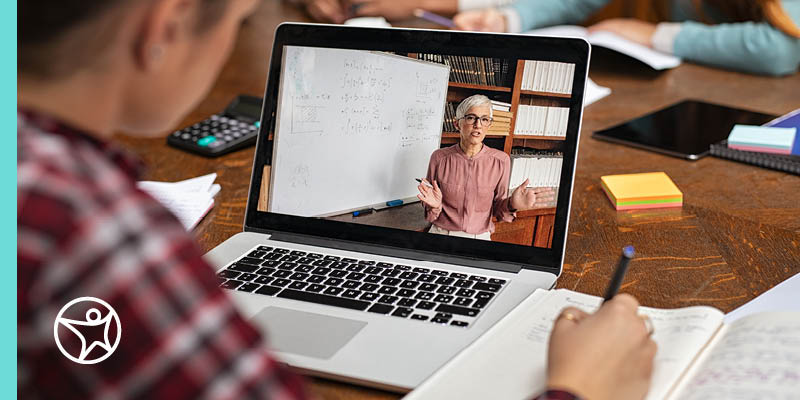The Benefits of Taking AP® Classes for Online High School Students
by Valerie Kirk
5 min to read
As online students start building their high school schedules, they may consider taking Advanced Placement® classes, or AP classes, which are college-level courses offered to students in high school in several different subjects, including history, biology, psychology, chemistry, calculus, and computer science. AP courses give students the opportunity to challenge themselves in subjects they find interesting or where they excel.
AP classes are more rigorous than honors classes and help students develop critical thinking skills, which will benefit them on their journey after high school. AP courses culminate with the AP exam, which is administered by the College Board. Depending on the student’s score on the exam and the college’s admission requirements, students may earn college credit for the AP classes they take in high school.
If you are asking yourself, can you take AP classes online? The answer is yes!
How Online AP Courses are Taught
Both brick-and-mortar schools and online schools can offer AP classes, which students can often take starting their freshman year. Schools must get their AP course syllabuses approved by the College Board before they can offer the class. This ensures that the topics being covered in the class meet the high standards required for a college-level course and that they cover what students will be tested on during the exam.
Online AP teachers are trained in teaching the approved AP course syllabus. Because these classes take a deeper dive into the subject matter, teachers are often passionate about the subject and know how to elicit the critical-thinking skills their students will require to meet the demands of the class.
Each school determines whether a student needs prerequisite classes before taking an AP course or if a teacher recommendation is required. Often, students in 9th and 10th grade are able to take Pre-AP courses that serve as pre-requisites to AP courses and are sometimes weighted.
Students taking AP classes in online high school may experience:
Live, Virtual Classes
Online AP classes will typically have live class sessions online with the teacher each week. These classes offer the opportunity to further explore the topic in a group setting. These sessions often include class discussions facilitated by the teacher, who will encourage participation.
Individual Support
Because online school can provide more opportunities for individual support, students can meet with their AP teacher during office hours or by scheduling an appointment to discuss topics they might find confusing, to get clarification on anything, or if they need a little extra support with the subject matter.
Study Groups
Online AP course teachers encourage students to form study groups to help them make connections with other kids in the class and to help them stay on track with the rigorous and demanding coursework.
Counselor Support
Online school counselors work with students to help them determine if taking AP classes supports their college and career goals and how the classes will fit into their overall online high school course schedule.
In-Person AP Exams
While it is possible for AP exams to be administered by online schools, it isn’t common. Many students that take AP classes online are generally referred to local brick-and-mortar schools to take their exam and may be responsible for any exam fees.

Student Expectations
Students who choose to take AP courses online should be highly organized and motivated to ensure they follow the syllabus and complete the course assignments on time. Because online school offers flexibility, students can complete their lessons at a time most convenient for them, but it is important to keep pace with the assignment due dates, as playing catch-up in an AP class can be challenging.
Benefits of Taking AP Courses in Online High School
There are many benefits for students who choose to take AP courses online, especially when it comes to college admissions, including:
AP Classes are Typically Weighted
Instead of the typical grading method in which an “A” earns four points, an “A” in an AP course may earn five points. This allows students to achieve GPAs that are higher than the traditional 4.0 average. Grading scales are determined by each school, so students should check with their counselor about which grading scale will be used.
Students Can Save Money on College Tuition
Many colleges accept AP courses for college credit, which means that students may not have to take some of the required first-year college classes. This saves money on college tuition and gives students more time to take classes that are focused on their career goals or to explore other interests.
AP Classes Look Good on a College Application
When students take advantage of the most rigorous courses in high school, they demonstrate to college admissions advisors that they are highly motivated and don’t shy away from challenges. Having AP classes on college applications also shows that students have already developed the skills required to handle the academic rigor of a college level class.
AP Classes Can Lead to Higher College Entrance Exam Test Scores
Many students earn higher scores on SAT and ACT exams after completing AP courses. The critical-thinking, analytical, reading, and writing skills that are developed in AP courses can help a student achieve higher standardized test scores on these college admission exams.
Perhaps the most important benefit is that AP classes give students the opportunity to study subjects that they want to explore in greater detail during their high school years.
How to Take AP Classes Online
Connections Academy offers online AP courses in several subjects to support students on their path to college. If your student is already enrolled in Connections Academy, have them schedule some time with their counselor to discuss the benefits of fitting an online AP course into their schedule.
If you aren’t enrolled in Connections Academy but are interested in learning more about how online school can help your student prepare for college, view our online school eGuide.



